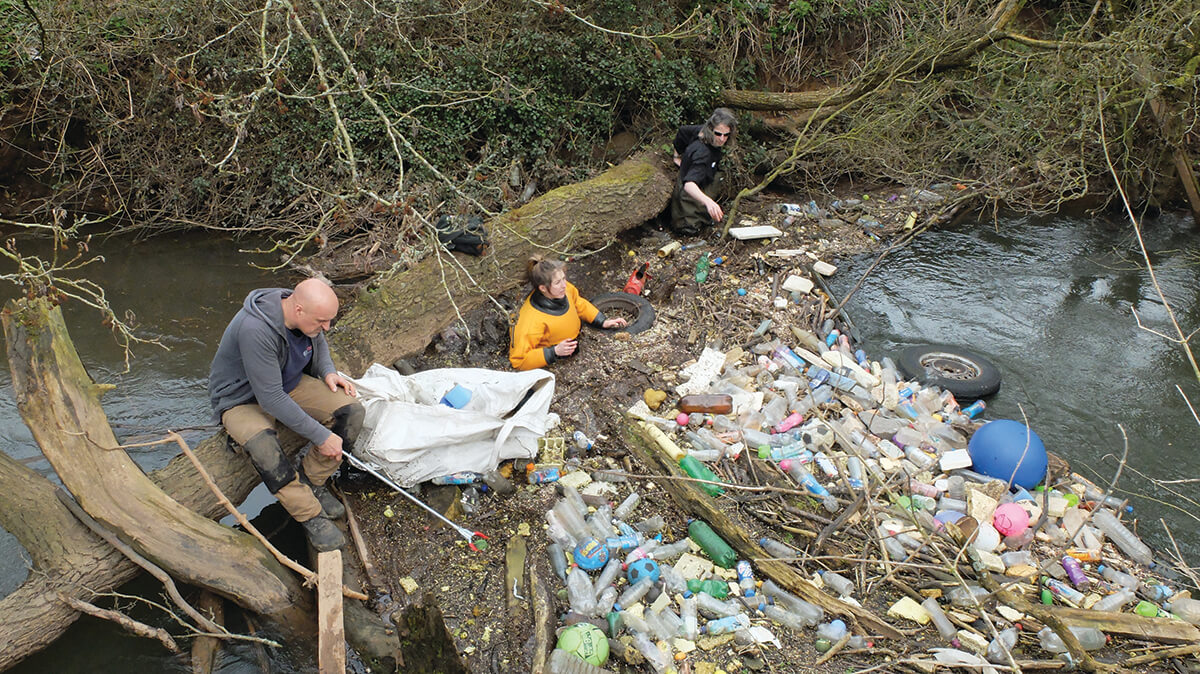The Waterpocalypse: Pollution
Emily Cooper
27/08/19
This World Water Week, we're investigating four of the most serious threats facing water across the globe: the Four Horses of the Waterpocalypse.
Of all the manmade problems facing our water, pollution is one of the most insidious.
For years, we have pumped the oceans and rivers full of waste. Our water is laced with dangerous chemicals from agriculture, industry and our homes—combining to create an often-deadly cocktail. Each year, thousands of fish die in pollution incidents and ecosystems struggle under the burden of plastic and rubbish. By 2050, it’s thought that there will be more plastic than fish in the ocean. Is this the future we want? One where a truckload of plastic enters the ocean every single minute?
 Thanks to Bristol Avon Rivers Trust for this fantastic photo showcasing their on the ground (or rather, in the water!) conservation work
Many people don’t realise that sewage is still directly discharged into UK rivers. After periods of heavy rain, combined sewer overflows expel waste into rivers. This process, although necessary to prevent homes from flooding, has devastating impacts on plant and wildlife. A shocking 40% of rivers in England and Wales are polluted by sewage, so it should be no surprise that just 14% are in good ecological health.
Thanks to Bristol Avon Rivers Trust for this fantastic photo showcasing their on the ground (or rather, in the water!) conservation work
Many people don’t realise that sewage is still directly discharged into UK rivers. After periods of heavy rain, combined sewer overflows expel waste into rivers. This process, although necessary to prevent homes from flooding, has devastating impacts on plant and wildlife. A shocking 40% of rivers in England and Wales are polluted by sewage, so it should be no surprise that just 14% are in good ecological health.
 Thanks to Bristol Avon Rivers Trust for this fantastic photo showcasing their on the ground (or rather, in the water!) conservation work
Many people don’t realise that sewage is still directly discharged into UK rivers. After periods of heavy rain, combined sewer overflows expel waste into rivers. This process, although necessary to prevent homes from flooding, has devastating impacts on plant and wildlife. A shocking 40% of rivers in England and Wales are polluted by sewage, so it should be no surprise that just 14% are in good ecological health.
Thanks to Bristol Avon Rivers Trust for this fantastic photo showcasing their on the ground (or rather, in the water!) conservation work
Many people don’t realise that sewage is still directly discharged into UK rivers. After periods of heavy rain, combined sewer overflows expel waste into rivers. This process, although necessary to prevent homes from flooding, has devastating impacts on plant and wildlife. A shocking 40% of rivers in England and Wales are polluted by sewage, so it should be no surprise that just 14% are in good ecological health.
What are Rivers Trusts doing?
Last year, local Rivers Trusts held 556 river cleanups, helping to remove physical pollution from the water and riverbank. Take a look at the video below to see one of our local Trusts in action! In addition, Rivers Trusts attended 414 pollution incidents and addressed water quality concerns. Attending these events can help to identify - and consequently rectify - sources of pollution. Rivers Trusts employ more than 50 farm advisors to help farmers make sustainable choices on their land - including taking measures to reduce agricultural pollution. Many of our local Trusts also run sessions for schoolchildren, helping them to learn about the threat of pollution and take this information back to their families. https://www.youtube.com/watch?v=RAHVg_8kuNoWhat can I do to help?
- Choose reusable and biodegradable products whenever you can. Even if you properly dispose of plastics and other single-use items, it’s possible that they will end up polluting our rivers and streams
- Never flush wet wipes, cotton buds or other items down the toilet!
- Recycle as much as you can
- Volunteer with your local Rivers Trust
- Fundraise for the Rivers Trust
- Donate to our movement